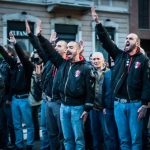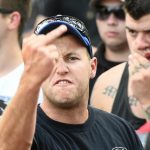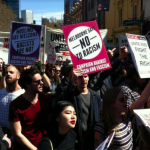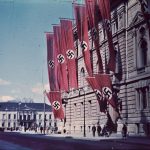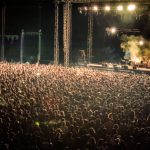The Rise of Australian Neo-Nazis: An Interview with Online Activist Slackbastard
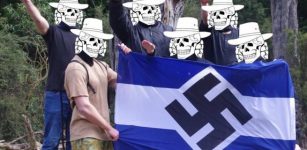
Over recent years, a number of loosely affiliated white nationalist groups have been organising online and rallying on the streets in this country. And these far-right groupings are united in their hostility towards asylum seekers, immigration, as well as the Muslim religion.
The first to appear as part of this resurgence in so-called “patriotism” was Reclaim Australia back in 2015. Since then, other right-wing groups began to form, including the United Patriots Front (UPF) and the True Blue Crew.
Another group that’s been gaining media attention over the last few months is the Antipodean Resistance (AR). Formed in late-2016, AR is made up of young Anglo Australian men, some with origins in the white nationalist groups that came before.
But where this secretive group differs is that AR openly espouses neo-Nazism.
Bigots mobilising
AR began organising on the extreme right website Iron March in 2016. In the first months of last year, photos of AR members partaking in radicalisation camps in the Queensland and Victorian wilderness began appearing online.
Participants were photographed holding blue and white striped flags emblazoned with swastikas, whilst performing the Nazi salute.
On its website, AR proclaims, “We’re the Hitlers you’ve been waiting for.” The group goes on to explain that the swastika flag “doesn’t just represent our worldview,” but it “also represents our transition to more open activism.”
In March, the recently formed South Australian AR chapter was involved in stickering Adelaide University with posters that said “Keep Australia White,” which also listed a number of derogatory terms for people from different ethnic groups.
In September last year, the self-proclaimed fascists were involved in a similar action at the University of Tasmania where racist and homophobic propaganda was posted. And the group was also involved in putting up similarly horrendous anti-same-sex marriage posters around Melbourne.
Potential for violence
AR has stated that it modelled itself on the UK’s National Action (NA) and Scandinavia’s Nordic Resistance Movement (NRM).
NA has been classified as a terrorist organisation in the UK. And some of its members have been arrested on suspicion of terrorist offences. While NRM members were imprisoned last year for carrying out bomb attacks on a left-wing bookstore and an asylum seeker centre.
The escalating levels of violent crime being planned and sometimes perpetrated by these extremist far-right groups overseas has been documented, which has led some Australian commentators to raise concerns about the potential for similar terrorist actions to be carried at home.
An online activist
Independent researcher Andy Fleming monitors the activities of the Australian far-right online. He documents their activities on the slackbastard blog and Facebook page. And he’s also co-written a detailed history of the radical right in Australia.
Sydney Criminal Lawyers® spoke with Andy Fleming, aka slackbastard, about the formation of the Antipodean Resistance, the issues that can arise from mainstream media reporting on white nationalist groups, and why it’s necessary to keep a check on the far-right.
Firstly, the Antipodean Resistance seems to have taken things a step further than some of the earlier white nationalist groups, in that it proclaims to be neo-Nazi.
Andy, in your opinion, how does AR differ from the other right-wing groups? And why would you say things have moved further in this direction?
Neo-Nazi groups have operated in Australia more or less constantly throughout the post-World War Two period, but remained very much on the fringes of political life. AR announced its existence in late-2016, but there was some organisational development prior to this point.
Iron March acted as a central focus for AR and put its membership in contact with other neo-Nazi groups, including National Action in the UK and Atomwaffen in the US.
Its members had some involvement with the UPF, attending a number of its events in Melbourne, and the UPF emerged out of Reclaim as a kind of political vanguard.
AR is distinguishable from the UPF in that the UPF never proclaimed its adherence to neo-Nazi beliefs – in fact, it explicitly denied them – and like Reclaim wrapped itself in the national flag.
Beyond this, both Reclaim and the UPF provided the kind of warm, nurturing environment in which a small group of young white men could gather and then embark upon forming a group like AR.
The development of AR could also be placed within the framework of “online radicalisation” – a framework normally applied to young Muslims – but it’s important to note that this radicalisation also took place in the political space opened up by Reclaim and included participation in public protest like that in Coburg in June 2016.
This rally was organised in explicit opposition to the left and government treaties with Indigenous peoples, and in support of government policies of mandatory detention, offshore prisons for asylum seekers and the forced closure of remote Aboriginal communities.
The collapse of Reclaim and the UPF as a street-based movement left behind layers of young men, some of whom subsequently gravitated towards more openly fascist, neo-Nazi and white supremacist ideas and networks.
Even if it was short-lived, frequently incoherent and politically-underdeveloped, Reclaim and the UPF gave its participants a very small taste of power, mostly in the form of public attention. And in its wake, those young men whose feelings were especially stirred by this phenomenon wanted more.
Otherwise, I don’t think that these ideas and political sympathies were ever very far from the surface. And certainly, Reclaim, UPF and other lesser-known groupuscules gave fascists, neo-Nazis and white supremacists opportunities to assume key organisational roles and a public platform.
So, this group has been running radicalisation camps in the bush, as well as plastering offensive racist and homophobic posters across the country.
Other than spreading hateful messages, what do you think they’re trying to achieve? And just how widespread is their influence?
The initial phase is about attracting attention, and then recruits. The provocative nature of their propaganda and its placement at university campuses, high schools, and parliamentary offices is deliberate and calculated to cause maximum publicity.
It’s worked to the extent that many thousands are now aware of the group’s existence and some very small segment of that public audience has thrilled to their message and contacted AR seeking more information and/or to join.
In terms of their influence, AR has managed to attract the support and participation of a small number of young men, but it’s also been derided by others – who might otherwise largely share its worldview – as either a government-sponsored honeypot and/or another example of LARPing (live action role-playing).
As you’ve noted, AR has stated that the group modelled itself on National Action and the Nordic Resistance Movement. Both these groups have been implicated in violent crimes.
Considering AR has based itself on these extremist groups, do you have concerns its members could carry out violent acts similar to those perpetrated by groups like these in Europe?
It’s certainly a possibility. But, calculating how great that risk is is very difficult without gaining greater access to the group’s internal discussions.
Further, the legal and political environment in Australia is different in significant ways to that in the UK, for example, with UK authorities having both access to stronger repressive legislation and a demonstrated willingness to employ it in the case of NA.
I would also add that potential recruits to AR are initially surveyed to ascertain their views, and a key text included in this vetting process is Siege by the veteran US-based neo-Nazi James Mason.
In the US, Atomwaffen has attempted to employ his methodology, and this has resulted in a series of murders, attempted murders, and other violent activity.
So, there’s a reasonable basis for concern about violent escalation on the part of AR, especially if it can draw upon a wider network of serious young fascists who have greater access to the means of undertaking such activities.
Having quintessential racist Pauline Hanson in federal parliament is likely to embolden groups like these. But, she’s not the only one fostering this climate of hate.
What sort of individuals or forces would you say are leading to a situation where AR and other white nationalist groups are becoming more vocal in this country?
Notwithstanding their political limitations from an extreme-right perspective, Hanson and the One Nation Party (ONP) perform the role of a kind of political lodestone for many on the right who exist largely outside of mainstream conservative opinion.
This is especially so, given Hanson and ONP’s sometimes explicit, sometimes implicit, embrace of white nationalism and generalised xenophobia.
The ability of groups like AR to be vocal is dependent on their organisational capacities, which are very modest. This is why it also relies on media reportage to boost its message. But, there’s a distinction to be made between being vocal and being publicly vocal, and AR operates largely in secrecy.
This is not the case with other white nationalist groupings – for example, the Australia First Party – who remain present, but with little real public support.
However, the capacity for such groupings to capitalise upon broader social and economic changes remains and should be considered critical to their ability to do so.
The Lindt cafe siege, for example, was cited by numerous spokespersons for Reclaim as a key moment propelling them into public protest and political activity generally, while the seemingly endless war on terror is fertile ground for the development of ultra-nationalist sentiment.
You’ve criticised the way the mainstream media has been reporting on the rise of the Antipodean Resistance.
How would you describe media coverage of AR and other far-right groups like it? And what sort of effect would you say it’s having?
The failings of media reportage in this context are partly to do with the underlying structural conditions in which news reportage takes place and partly the anonymous and clandestine nature of the activities of AR and similar groupings.
In the absence of much other publicly available information about the group, and an inability or unwillingness to seriously investigate the group’s operations, mostly what remains is their propaganda, its obvious offensiveness – and possible illegality – and the appalled reactions of targeted groups and individuals.
If the principal goal of AR’s propaganda is to draw attention to itself, then reportage of this kind simply amplifies the group’s message.
A key to understanding this strategy is to understand that AR is fully cognisant of the fact that its ideological productions will undoubtedly shock and appal many, but the overriding goal is to reach those few who welcome their perspective.
Otherwise, it’s important to neither exaggerate nor to underestimate the group’s actual capacities while bearing in mind that, as the chasm between its extravagant rhetoric and those capacities widens, the temptation to act more forcefully in pursuit of its aims becomes more serious – if also potentially disastrous.
In January, Channel 7 News took reporting on white nationalist activities to a whole new level, when it attended a meeting of another right-wing group called the True Blue Crew that was also attended by UPF members.
The meeting was to discuss forming a vigilante group with the aim of tackling Melbourne’s so-called “African gang crisis.” Channel 7 actually referred to these men as “activists” and gave airtime to notorious former UPF leader Blair Cottrell.
How have things gotten so far that a major network is giving credence to these sorts of groups? And what’s the likely outcome of portraying these men as community crusaders on prime-time TV?
Without having access to Channel 7’s internal deliberations on how to go about reporting the event, it’s difficult to say. But, the report took place in the broader context of a politically driven campaign to demonise African youth and in an election year in which law and order issues will likely be one central focus.
In other words, there are important segments of the media and political establishment aligned with the Liberal Party in Victoria, which have consciously sought to use the so-called “African gang crisis” to create a wedge issue by which to unseat the state Labor government.
But, I suppose this particular piece of reportage also speaks to the always-sensationalist approach commercial television news relies on in order to generate an audience and, significantly, the ways in which an extreme right political formation can capitalise upon political and social anxieties of this sort.
Naturally, falsely portraying racist gangs as “defenders of the community” can potentially have very serious deleterious effects, which I suppose underlies the importance of serious journalism and responsible political commentary.
I should also add that in September 2016 Triple J’s Hack provided Cottrell with an arguably much more significant platform on national television.
As you’ve pointed out, last October, some of the key white nationalists formed a new group. This time they’re calling themselves The Lads Society. And it includes Cottrell.
What’s the purpose of this new group? And do you think it marks a further intensification of where the white nationalists are taking things?
The formation of The Lads Society is the logical culmination of the UPF’s efforts over the course of 2015 to 2017.
So, in February 2016, at the same time that the UPF embarked upon a series of public meetings in Toowoomba, Orange and Bendigo in order to promote the launch of its stillborn political party Fortitude, internal UPF documents were released which outlined the group’s intention to form a political cadre.
This cadre would act in the same manner as similar such groupings in times past, albeit on a much tinier scale.
In other words, after the relative tumult of the street protests of 2015, the relative decline in the size and frequency of these events in 2016 and 2017, now is an appropriate time for whatever remains of the UPF and its following to consolidate and to form a base from which to grow in the future.
Of particular concern in this context is the involvement of ex-military and security industry workers, groupings which bring particular skills to the project which, in my view, does not bode well.
And lastly, over recent years, we’ve seen the rise of Trump, the UK’s Brexit vote and the return of One Nation in this country. And along with these right-wing political developments, we’ve also seen these far-right nationalist groups coming to the fore in Australia.
Where do you see this all leading to? Do you think these groups are likely to gain more traction in coming years, or are they more likely to fizzle out?
One of the chief difficulties facing these groups is the generally immature and fractious nature of its participants.
This is not helped by the fact that many, if not most, are driven by passionate resentments of nominated others, and frequently lack the political nous necessary to place their various projects on a firmer political and organisational foundation.
Insofar as formal political participation is concerned, there are also systemic blockages that are a product of the preferential voting system, considerations which often don’t apply in the case of many European electoral systems.
Further, it could be argued that conservatism in Australia is facing similar challenges to conservative political currents in the UK, the US and elsewhere, and both political parties and their social base are changing in ways that could provoke a crisis similar to that witnessed in the US with the rise of Trump.
In the US, Spencer Sunshine has written extensively on this phenomenon, and especially the rise of what he terms “independent Trumpism.”
In general, I think it’s important to monitor developments on the far-right because, as comical or as sinister as they may seem, I see no good reason to expect that the disastrous course of twentieth century history can simply never again happen without motivated publics ensuring that it does not.


